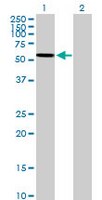AP1138 Sigma-AldrichAnti-ARSA Mouse pAb
Anti-ARSA, mouse polyclonal, recognizes the ~55 kDa ARSA protein in human lymph node tissue. It is validated for Western blotting and paraffin sections.
More>> Anti-ARSA, mouse polyclonal, recognizes the ~55 kDa ARSA protein in human lymph node tissue. It is validated for Western blotting and paraffin sections. Less<<Productos recomendados
Descripción
| Replacement Information |
|---|
Tabla espec. clave
| Species Reactivity | Host | Antibody Type |
|---|---|---|
| H | M | Polyclonal Antibody |
Products
| Número de referencia | Embalaje | Cant./Env. | |
|---|---|---|---|
| AP1138-50UG | 50 μg |
| References |
|---|
| Product Information | |
|---|---|
| Form | Liquid |
| Formulation | In PBS, pH 7.2. |
| Positive control | Human lymph node tissue |
| Preservative | None |
| Quality Level | MQ100 |
| Biological Information | |
|---|---|
| Immunogen | Full length human ARSA (aa 1-507) |
| Immunogen | Human |
| Host | Mouse |
| Isotype | IgG |
| Species Reactivity |
|
| Antibody Type | Polyclonal Antibody |
| Physicochemical Information |
|---|
| Dimensions |
|---|
| Materials Information |
|---|
| Toxicological Information |
|---|
| Safety Information according to GHS |
|---|
| Safety Information |
|---|
| Product Usage Statements |
|---|
| Packaging Information |
|---|
| Transport Information |
|---|
| Supplemental Information |
|---|
| Specifications |
|---|
| Global Trade Item Number | |
|---|---|
| Número de referencia | GTIN |
| AP1138-50UG | 04055977227833 |
Documentation
Anti-ARSA Mouse pAb Ficha datos de seguridad (MSDS)
| Título |
|---|
Anti-ARSA Mouse pAb Certificados de análisis
| Cargo | Número de lote |
|---|---|
| AP1138 |









